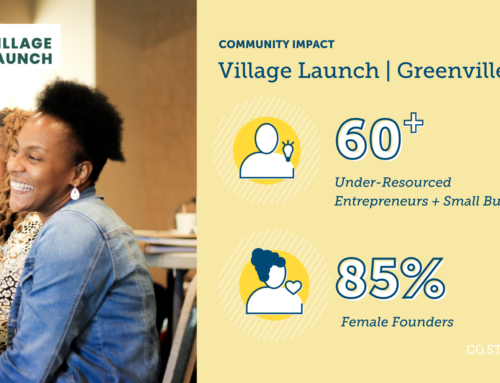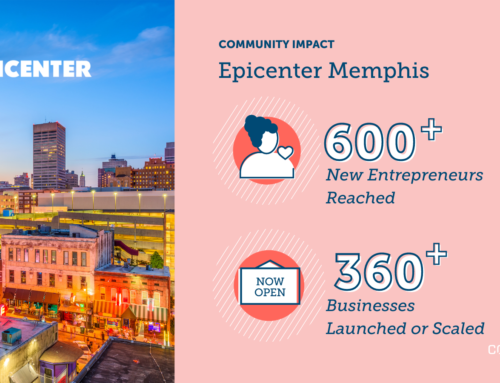Part one of a series from our founder on exploring a new approach to economic development that places individuals, families, and entrepreneurs at the center.
By Enoch Elwell
Beneath the tragedy and turmoil of 2020, there is a clear cry for something new. There is a cry to remove the social infrastructure that makes getting quality healthcare and relief from a raging pandemic often impossible. There is a cry for a society where your skills and talent—and not your skin color—determines your ability to achieve your potential. There is a cry to move from the broken economy we have to the resilient economy we need.
How can we do that?
To begin with, we need passionate engagement from at least 3.5% of the population. Research shows even a tiny fraction of the population can shift an entire culture. If overhead shots of the demonstrations taking place across the country are any indication, it is clear that more than the 3.5% of the population is ready to move us toward our “Next Economy.”
There is a cry for a society where your skills and talent—and not your skin color—determines your ability to achieve your potential. There is a cry to move from the broken economy we have to the resilient economy we need.
But what does that shift toward our next economy look like?
It means we complete our transition from the Industrial Age to the Connected Age. Traditionally we have focused more on the continued incremental improvements of the industrial age (i.e. the fourth industrial revolution), defined by technological change and its ability to amplify and accelerate our rate of communication. However, while technological evolution is a significant accelerator toward this shift, the transition between the Industrial Age we are clinging to and the Connected Age we need to grab hold of requires a much more significant philosophical transformation.
It is about recognizing the importance of individuals and the relationships that bond those individuals into organizations and communities.
Traditional economic development has largely focused on increasing economic output by attracting and keeping companies that deliver the maximum number of jobs possible. Of course, corporate recruitment will always be an important function of economic developers. That said, developing thriving communities in this new, unfamiliar world requires both a top-down (traditional, industrial age recruitment and retention) and bottom-up (developing a community of support for individual entrepreneurs) approach.
Over the past several years, I worked with a small team at the Kauffman Foundation to develop guiding principles to help articulate this evolution in economic development. The “Elements of an Ecosystem” in the Entrepreneurial Ecosystem Building Playbook will help guide your Connected Age economic development strategy by prioritizing support of:
- Entrepreneurs who aspire to start and grow new businesses, and the people who support entrepreneurs.
- Talent that can help companies grow.
- People and institutions with knowledge and resources to help entrepreneurs.
- Individuals and institutions (corporate, government) that serve as champion and conveners of entrepreneurs.
- Onramps (or access points) to the ecosystem so that anyone and everyone can participate.
- Intersections that facilitate the interaction of people, ideas, and resources.
- Stories that people tell about themselves and their ecosystem.
- A culture that is rich in social capital – collaboration, cooperation, trust, reciprocity, and a focus on the common good – makes the ecosystem come alive by connecting all the elements together.
Human-to-human connections like the ones described above will define a city or a region’s success in the Connected Age, regardless of the technology or platforms used for communication.
To be clear, the Connected Age is not on its way. It has already arrived. Every day, we witness people express their frustration over a lack of connection. They feel disconnected from their communities, their government, and their potential. They feel disconnected from an ability to control their own destiny, which ultimately may be the most devastating disconnection of all.
Healing the disconnect from one’s own destiny is a space where economic developers can truly make a difference.
Feeling disconnected from control over your own life first leads to apathy, but before long it manifests itself in explosive and often justified anger. Fortunately, healing the disconnect from one’s own destiny is a space where economic developers can truly make a difference. By recognizing the need to adopt a Connected Age strategy, economic developers can remove the barriers for the dreamers and builders in their community and give them the chance to take control over their own lives through entrepreneurship.
The benefits of a Connected Age approach to economic development also extend to economic developers themselves. The truth is economic development recruitment strategies focused on big businesses often fail because enticing a company to move from one community to another rarely succeeds. Corporate moves are expensive, disruptive, and sometimes controversial. Developing a strong Connected Age local economy depends on fostering homegrown entrepreneurial talent and connecting those entrepreneurs to mentors and other business leaders who are ready to reimagine their community.
When that connection occurs, a resilient entrepreneurial ecosystem and modern local economy is born.
Developing a strong Connected Age local economy depends on fostering homegrown entrepreneurial talent and connecting those entrepreneurs to mentors and other business leaders who are ready to reimagine their community.
Technology will not define the Connected Age.
Instead, technology will facilitate the human interaction we need to build a more empathetic, equitable, prosperous world. That journey begins when economic developers embrace their inner superhero and use their position and leadership to align with local grassroots activity to create that world.

ABOUT THE AUTHOR
Enoch Elwell is the founder and Chief Executive Officer of CO.STARTERS, as well as the co-founder of The Company Lab and a serial entrepreneur. He lives with his wife and children in Chattanooga, Tennessee. Follow him on LinkedIn, Medium, and Twitter for more thought leadership on economic development and entrepreneurship.
Ready to bring your community into the Connected Age?
Schedule a call to see how CO.STARTERS can help.




